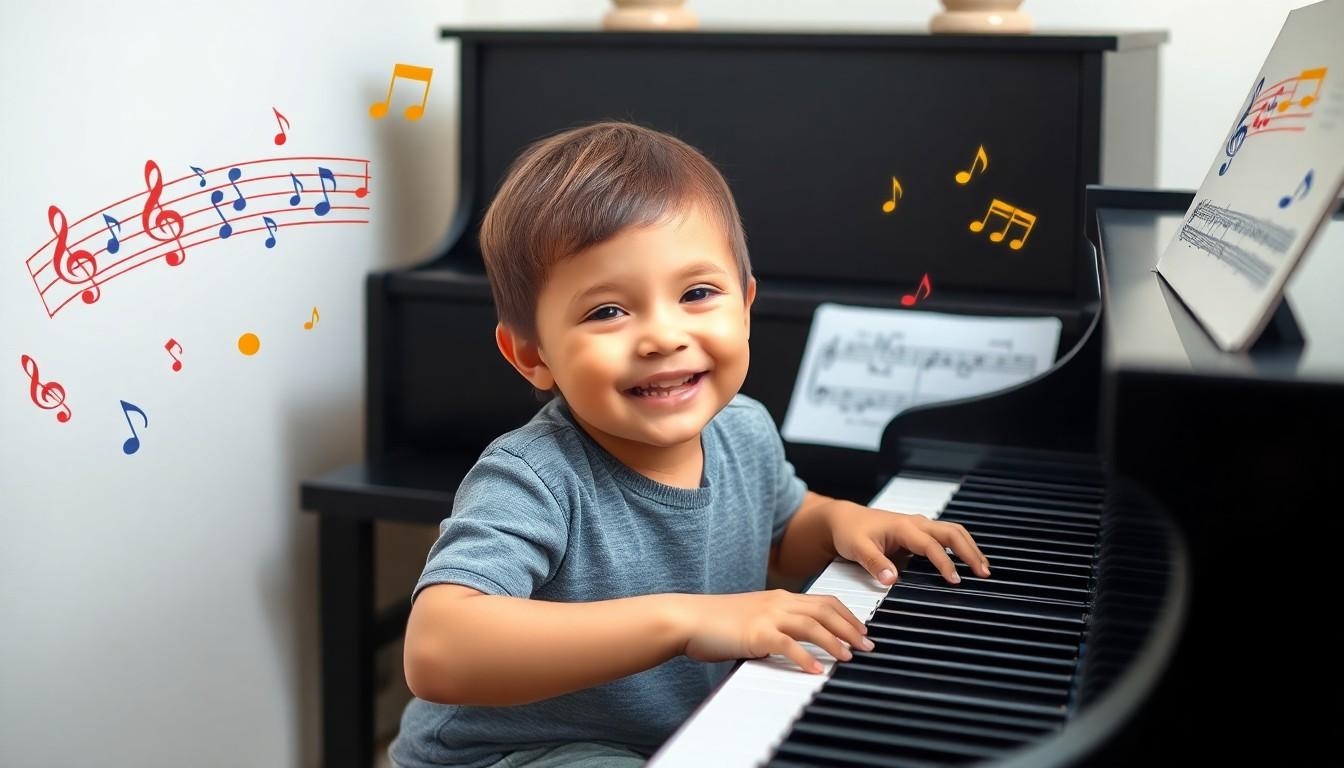Imagine a world where kids trade in their video games for violins and symphonies. Sounds like a fantasy, right? But classical music isn’t just for stuffy concert halls—it’s a vibrant playground for young minds. Engaging with classical music can spark creativity, enhance focus, and even boost academic performance. Who wouldn’t want their child to channel their inner Beethoven while mastering their math homework?
Table of Contents
ToggleUnderstanding Classical Music Kids
Engaging with classical music offers a unique opportunity for children. This genre fosters creativity and provides educational benefits that extend beyond traditional learning methods.
Benefits of Exposure to Classical Music
Exposure to classical music enhances emotional expression. Children learn to appreciate various emotions through melodies and harmonies. It also promotes discipline as they practice instruments regularly. Increased attention spans develop through active listening. Furthermore, classical music encourages teamwork when children participate in group performances. Benefits extend to improved social skills as children interact with peers during music activities.
Impact on Cognitive Development
Cognitive development is significantly impacted by classical music. Studies show children exposed to music perform better in math and reading. Enhanced problem-solving skills emerge through learning musical patterns. Memory retention improves as children memorize compositions. Additionally, classical music facilitates brain function, leading to better focus and concentration. Engaging with different musical forms aids in understanding complex concepts.
Popular Classical Music Pieces for Kids

Classical music offers numerous engaging compositions for young listeners. The following selections stand out for their appeal and accessibility.
Timeless Compositions
Popular pieces like Beethoven’s “Für Elise” enchant children with their memorable melodies. Tchaikovsky’s “Nutcracker Suite” captivates young audiences through its vibrant storytelling. Mozart’s “Eine kleine Nachtmusik” introduces rhythmic variety that sparks curiosity. Other favorites include Vivaldi’s “Four Seasons,” which paints musical landscapes of nature. Each composition invites exploration, helping kids connect emotions with sound.
Contemporary Adaptations
Modern adaptations of classical works also resonate with children. Movies often feature orchestral scores, such as Disney’s “Fantasia,” that introduce classical music in a fun context. Musical shows like “Classical Baby” blend animation and classical pieces, making the genre accessible. Various apps offer interactive experiences, allowing kids to play with and remix familiar compositions. These adaptations foster a sense of familiarity while encouraging deeper engagement with classical music.
Engaging Kids with Classical Music
Engaging kids with classical music can spark creativity and joy. Various activities and listening practices enhance this experience.
Activities and Games
Incorporating games into classical music engagement captivates children’s attention. Consider musical chairs with classical pieces, where players must find a seat when the music stops. Create a scavenger hunt featuring instruments or composers, encouraging exploration. Painting or drawing while listening to compositions allows kids to express emotions through art. Musical storytelling can also work, letting kids develop narratives based on pieces. These interactive methods serve to make classical music an enjoyable part of children’s lives and foster appreciation for the genre.
Recommended Listening Practices
For effective listening, create a routine that involves daily exposure to classical music. Start with short pieces, progressively increasing duration as children become accustomed. Encourage discussions about feelings evoked by different works. Listening in varied settings, such as during family meals or quiet time, further reinforces engagement. Integrating apps or online platforms featuring kid-friendly classical music can broaden exposure. Consider attending concerts or performances designed for children, providing an immersive experience. These practices enhance children’s understanding and appreciation of classical music while cultivating a lifelong connection to it.
Resources for Parents and Educators
Parents and educators seeking to introduce children to classical music can benefit from a multitude of resources that foster learning and appreciation.
Books and Guides
Numerous books provide insights into classical music for children. Titles like “Classical Kids: An Activity Guide to Music” offer engaging activities alongside information about composers and compositions. “The Composer is Dead” combines storytelling with humor, making classical music accessible for young readers. Guides focused on introducing music fundamentals can help structure lessons and listening experiences. Parents can explore music history through age-appropriate literature, increasing children’s knowledge while fostering interest. These resources support creativity and enhance learning through interactive practices.
Online Courses and Workshops
Various online platforms now offer courses tailored to children interested in classical music. Websites like Coursera and Udemy feature engaging content specifically designed for kids. Workshops hosted by music organizations often include hands-on activities, fostering interactive learning. Programs focusing on instrument basics or music theory encourage children to explore their talents. Parents can discover free resources or affordable online classes, ensuring access to quality education without significant investment. These courses provide flexibility and cater to different learning styles, enriching children’s musical journey.
Encouraging children to explore classical music opens doors to creativity and emotional growth. This genre offers a unique way for kids to express themselves while enhancing their cognitive abilities. By integrating music into daily routines and engaging them through fun activities, parents and educators can cultivate a lasting appreciation for classical compositions.
The resources available today make it easier than ever for young learners to connect with music. Whether through interactive apps or engaging books, the possibilities are endless. Embracing classical music not only enriches children’s lives but also lays a strong foundation for their future development.




